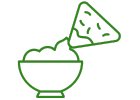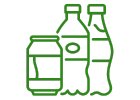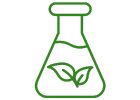The truth about salt lies of experts about the substance we cannot live without

Za nákup Vám přičteme:
+100.25 Bodů do Bonusového programu- Cold extremities may mean you need more salt.
- Chronic salt deficiency can increase insulin levels because insulin helps to maintain sodium in the kidneys.
- 8-10g salt = 3-4g sodium.
- A person with normally functioning kidneys and normal blood pressure can easily excrete up to 10 times more salt than they consume in an entire day.
- The original foods were water-based and had a much higher salt content than today's foods.
- On average, our kidneys are able to filter between 1.45kg - 1.63kg of salt (0.58kg - 0.65kg of sodium) per day.
- Low salt intake stresses the kidneys and causes reduced energy/fatigue as the body wants to prevent sweating. This can lead to weight gain.
- Ancient Romans consumed 25g of salt per day. Europeans in the 16th century consumed 40g a day and Europeans in the 18th century consumed up to 70g a day.
- Dieters on a low-carb (low-carbohydrate) plan need an extra 2g of quality salt per day.
- Salt is not additive and the body knows when it has had enough and can sweat out the excess.
- Higher salt consumption helps reduce stress and anxiety.
- Consuming salt before and during exercise helps cool the body faster due to increased blood circulation.
- Pregnant and breastfeeding women need more salt.
- The end of the book compares the pros and cons of various types of salts. The author's favourite is Redmond Real Salt.
... because salt is needed!
Experts' lies about a substance we can't live without
We've all heard the recommendation: if you want a healthy heart, don't eat more than one teaspoon of salt a day. Most people who care about their own health follow the generally accepted view - that a salt shaker is the surest way to prevent a heart attack - and then have to eat non-salty, non-greasy but "heart-healthy" foods.
But what if the advice about low salt intake is fundamentally wrong?
Dr. James DiNicolantonio, a leading cardiovascular researcher, has reviewed more than 500 publications in an effort to decipher the impact of salting on blood pressure and heart disease. And he came to a startling conclusion: the vast majority of us don't need to track our salt intake. Our health would actually benefit from more salt. The Truth About Salt tells the remarkable story of the unjust demonisation of salt - an unprecedented drama of egoism and competing interests. We learn the truth about how the salt took the rap for another white crystal: sugar.
Salt deficiency can lead to the following problems
- It intensifies cravings for sugar and refined carbohydrates.
- It's going to put the body into semi-cool mode.
- It causes obesity, insulin resistance, type 2 diabetes, cardiovascular disease, chronic kidney disease, and increased blood pressure and heart rate.
In contrast, eating all the salt your body can handle will have the following benefits
- It will improve everything from sleep, energy and mental focus to physical fitness, fertility and sexual performance.
- It will treat all common chronic diseases, including cardiac ones.
Dr. DiNicolantonio will introduce you to the best ways to put salt back into your diet. Its revolutionary five-point program allows you to "recalibrate the salt thermostat" in your body to get to your unique, ideal salt level.
Science has already moved away from the dogma of low salt intake and you should too - your life may depend on it!
Additional parameters
| Category: | Specialised literature |
|---|---|
| EAN: | 9788075652355 |
| Počet stran: | 287 |
| Datum vydání: | 1.11.2017 |
| Překladatel: | Jan Kozák |
| Vazba: | Brožovaná s klopami |
| Originální Název: | The Salt Fix: Why the Experts got it All Wrong – and How Eating More Might Save Your Life |
| The item has been sold out… | |
Be the first who will post an article to this item!
Be the first who will post an article to this item!

.jpg)

































































![NORTH AMERICAN HERB & SPICE - Masážní olej pro děti - RUBBING OIL [30 ml]](https://cdn.myshoptet.com/usr/www.pravebio.cz/user/shop/detail/2096_north-american-herb-spice-masazni-olej-pro-deti-rubbing-oil--30-ml-.png?66db503c
)







